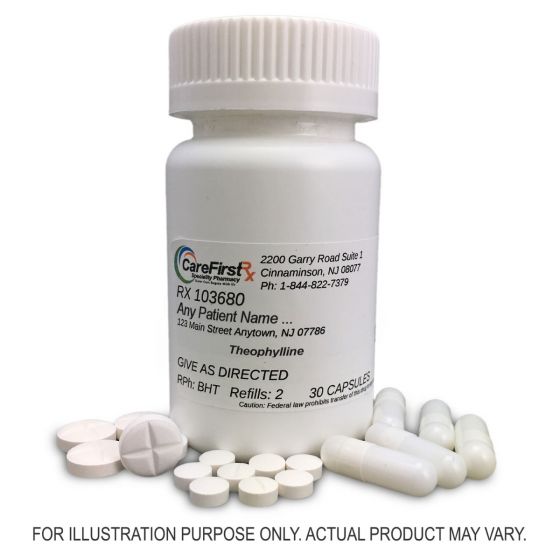Theophylline is a drug still used to reverse airflow obstruction associated with chronic lung diseases i.e. asthma, COPD, chronic bronchitis, and emphysema. It works by two mechanisms: smooth muscle relaxation (bronchodilation) in the bronchioles mediated by inhibition of phosphodiesterase III (PDE III) and suppression of the response of airways to stimuli by an unknown mechanism. Theophylline is also thought to increase contraction of the diaphragm muscles. Because of theophylline’s similarity in structure to caffeine, it produces a well-known caffeine-like side effect profile such as insomnia, nausea, and headache. Serious adverse effects can occur at higher doses especially in overdoses. Although used less frequently since the advent of alterative inhaled therapies, theophylline still maintains its place in therapy for those who need special consideration. Theophylline has also been used extensively in the veterinary population particularly for dogs.
Pronunciation: (thee OFF i lin)
Brand Names: US Elixophyllin; Theo-24; Theochron
Chemical Structure: Methylxanthine class, similar to caffeine
What is this drug used for?
- It is used to treat breathing problems.
- This drug is not to be used to treat intense flare-ups of shortness of breath. Use a rescue inhaler.
What do I need to tell my doctor BEFORE I take this drug?
- If you have an allergy to theophylline or any other part of this drug.
- If you are allergic to any drugs like this one, any other drugs, foods, or other substances. Tell your doctor about the allergy and what signs you had, like rash; hives; itching; shortness of breath; wheezing; cough; swelling of face, lips, tongue, or throat; or any other signs.
- If you are taking St. John's wort. Do not take St. John's wort with this drug. If you have been taking St. John's wort, talk with your doctor before you stop taking it.
This is not a list of all drugs or health problems that interact with this drug.
Tell your doctor and pharmacist about all of your drugs (prescription or OTC, natural products, vitamins) and health problems. You must check to make sure that it is safe for you to take this drug with all of your drugs and health problems. Do not start, stop, or change the dose of any drug without checking with your doctor.
What are some things I need to know or do while I take this drug?
All products:
- Tell all of your health care providers that you take this drug. This includes your doctors, nurses, pharmacists, and dentists.
- This drug may affect certain lab tests. Tell all of your health care providers and lab workers that you take this drug.
- Wear disease medical alert ID (identification).
- Have blood work checked as you have been told by the doctor. Talk with the doctor.
- If you have high blood sugar (diabetes), you will need to watch your blood sugar closely.
- Limit your use of caffeine (for example, tea, coffee, cola) and chocolate. Use with this drug may cause nervousness, shakiness, and a fast heartbeat.
- Talk with your doctor before you drink alcohol.
- If you start or stop smoking tobacco or marijuana, talk with your doctor. How much drug you take may need to be changed.
- If you get sick, have a fever, or have a long-term illness that gets worse, talk with your doctor.
- Some other drugs may affect how much of this drug is in your body. Talk with your doctor or pharmacist to see if any of your other drugs may interact with this drug.
- Tell your doctor if another doctor gives you a new drug or tells you to stop taking a drug that you have been using.
- If you are 60 or older, use this drug with care. You could have more side effects.
- Use with care in children. Talk with the doctor.
- Tell your doctor if you are pregnant or plan on getting pregnant. You will need to talk about the benefits and risks of using this drug while you are pregnant.
- Tell your doctor if you are breast-feeding. You will need to talk about any risks to your baby.
What are some side effects that I need to call my doctor about right away?
WARNING/CAUTION: Even though it may be rare, some people may have very bad and sometimes deadly side effects when taking a drug. Tell your doctor or get medical help right away if you have any of the following signs or symptoms that may be related to a very bad side effect:
- Signs of an allergic reaction, like rash; hives; itching; red, swollen, blistered, or peeling skin with or without fever; wheezing; tightness in the chest or throat; trouble breathing, swallowing, or talking; unusual hoarseness; or swelling of the mouth, face, lips, tongue, or throat.
- Signs of low potassium levels like muscle pain or weakness, muscle cramps, or a heartbeat that does not feel normal.
- Signs of high blood sugar like confusion, feeling sleepy, more thirst, more hungry, passing urine more often, flushing, fast breathing, or breath that smells like fruit.
- Signs of too much acid in the blood (acidosis) like confusion; fast breathing; fast heartbeat; a heartbeat the does not feel normal; very bad stomach pain, upset stomach, or throwing up; feeling very sleepy; shortness of breath; or feeling very tired or weak.
- Upset stomach or throwing up.
- A fast heartbeat.
- A heartbeat that does not feel normal.
- Very bad dizziness or passing out.
- Very nervous and excitable.
- Shakiness.
- Very bad headache.
- Feeling confused.
- Not able to sleep.
- Seizures.
- Change in the way you act.
- Feeling irritable.
- Muscle spasm.
What are some other side effects of this drug?
All drugs may cause side effects. However, many people have no side effects or only have minor side effects. Call your doctor or get medical help if any of these side effects or any other side effects bother you or do not go away:
- Feeling nervous and excitable.
- Restlessness.
- Headache.
- Loose stools (diarrhea).
- Passing urine more often.
These are not all of the side effects that may occur. If you have questions about side effects, call your doctor. Call your doctor for medical advice about side effects. You may report side effects to your national health agency.
How is this drug best taken?
Use this drug as ordered by your doctor. Read all information given to you. Follow all instructions closely.
- Follow how to take this drug as you have been told by your doctor. Do not use more than you were told to use.
- Take this drug at the same time of day.
- Some foods may change how this drug works or raise the chance of side effects. Talk with your doctor about how to take this drug with food.
What do I do if I miss a dose?
- Skip the missed dose and go back to your normal time.
- Do not take 2 doses at the same time or extra doses.
How do I store and/or throw out this drug?
- Store at room temperature.
- Store in a dry place. Do not store in a bathroom.
- Protect from light.
- Keep all drugs in a safe place. Keep all drugs out of the reach of children and pets.
- Throw away unused or expired drugs. Do not flush down a toilet or pour down a drain unless you are told to do so. Check with your pharmacist if you have questions about the best way to throw out drugs. There may be drug take-back programs in your area.
General drug facts
- If your symptoms or health problems do not get better or if they become worse, call your doctor.
- Do not share your drugs with others and do not take anyone else's drugs.
- Keep a list of all your drugs (prescription, natural products, vitamins, OTC) with you. Give this list to your doctor.
- Talk with the doctor before starting any new drug, including prescription or OTC, natural products, or vitamins.
- Some drugs may have another patient information leaflet. If you have any questions about this drug, please talk with your doctor, nurse, pharmacist, or other health care provider.
- If you think there has been an overdose, call your poison control center or get medical care right away. Be ready to tell or show what was taken, how much, and when it happened.
References:
- Theophylline. Lexi-Drugs. Lexicomp. Wolters Kluwer Health, Inc. Riverwoods, IL. Available at: http://online.lexi.com. Accessed July 23, 2018.
- Theo-24 [package insert]. Malvern, PA 19355. Endo pharmaceuticals Inc. 2016.
- Weinberger M, Hendeles L. Theophylline in asthma. N Engl J Med 1996; 334:1380-1388
Consumer Information Use and Disclaimer: This information should not be used to decide whether or not to take this medicine or any other medicine. Only the healthcare provider has the knowledge and training to decide which medicines are right for a specific patient. This information does not endorse any medicine as safe, effective, or approved for treating any patient or health condition. This is only a brief summary of general information about this medicine. It does NOT include all information about the possible uses, directions, warnings, precautions, interactions, adverse effects, or risks that may apply to this medicine. This information is not specific medical advice and does not replace information you receive from the healthcare provider. You must talk with the healthcare provider for complete information about the risks and benefits of using this medicine.




